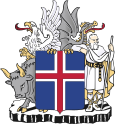 |
|---|
Parliamentary elections were held in Iceland on 28 October 1911. [1]
 |
|---|
Parliamentary elections were held in Iceland on 28 October 1911. [1]
The 30 elected members of the Althing were elected from single or double member constituencies by first-past-the-post voting, with six members appointed to the upper house by the Danish monarch. [2] [3] Suffrage was limited to men aged 25 or over and who met one of several set requirements including being a civil servant, holding a medical (or similar) degree, being a graduate of a university or seminary, or paying tax of at least four króna (or for farmers, any level of tax), and who were not in receipt of poor relief. [3]
10,303 of the 13,136 registered voters participated in the elections. [4]